The Works of St. Thomas Aquinas (18 vols.)
Digital Logos Edition
Overview
Thomas Aquinas stands among the most important thinkers in Christendom. In his writings we find the source of every intellectual development in the eight centuries following his life, especially on the nature and being of God. A theologian, philosopher, saint, and Doctor of the Church, the works of the “Angelic Doctor” are an essential foundation for understanding perhaps every topic in theology from the past 800 years.
The Works of St. Thomas Aquinas collection brings together many of his most influential works encompassing theology, philosophy, and textual commentary. Study the Summa Theologica with both the original Latin text and the Fathers of the English Dominican Province English translation. Delve into Scripture with Aquinas’ Catena Aurea (Golden Chain) commentary on the Gospels. Survey his exposition and commentary on philosophers like Aristotle and Boethius, as well as early Church Fathers such as Origen, Augustine, and Chrysostom. You’ll also find homilies written by Thomas Aquinas, as well as his thoughts on the Eucharist, the priesthood, and much more.
Available as 18 digital downloads, this collection encompasses over 50 print volumes—or over 20,000 pages—of philosophical writings by the scholastic theologian Thomas Aquinas.
Take a look at the Fathers of the Church Series (127 vols.), spanning five centuries of Christian history.
This title is included in the following collections
You can save when you purchase this product as part of a collection.
Thomas Aquinas Studies Collect...
$1,149.99$1,149.99Verbum 7 Diamond Legacy Librar...
$2,999.99$2,999.99Verbum 7 Portfolio Legacy Libr...
$4,749.99$4,749.99

- Presents the work of one of the most influential theologians in history
- Includes both the English and Latin text of the Summa and other works for easy side-by-side comparison
- Encompasses more than 20,000 pages of writing by the Angelic Doctor
- Allows for cross-referencing with other Church Fathers in your library
- Includes philosophical writings, theological writings, and commentaries
Perhaps no other man ever came so near to calling the Creator by his own name.
St. Thomas is important for us today precisely because of our lack. Timeless truth is always timely, of course, but some aspects of truth are especially needed at some times, and it seems that our times badly need seven Thomistic syntheses: (1) of faith and reason, (2) of the biblical and the classical, (3) of the ideals of clarity and profundity, (4) of common sense and technical sophistication, (5) of theory and practice, (6) of an understanding, intuitive vision and a demanding, accurate logic, and (7) of the one and the many, a cosmic unity or ‘big picture’ and carefully sorted out distinctions. I think it a safe judgment that no one in the entire history of human thought has ever succeeded better than St. Thomas in making not just one but all seven of these marriages which are essential to health and happiness.
- Title: The Works of St. Thomas Aquinas
- Author: Thomas Aquinas
- Pages: 20,000+ pages
- Languages: English and Latin
- Christian Group: Catholic
- Resource Type: Collected Works
- Topics: Medieval Philosophy, Theology
- Summa Theologica (English)
- Summa Theologica (Latin)
- Summa contra Gentiles
- Catena Aurea: Commentary on the Four Gospels, Collected out of the Works of the Fathers, Volume 1: St. Matthew
- Catena Aurea: Commentary on the Four Gospels, Collected out of the Works of the Fathers, Volume 2: St. Mark
- Catena Aurea: Commentary on the Four Gospels, Collected out of the Works of the Fathers, Volume 3: St. Luke
- Catena Aurea: Commentary on the Four Gospels, Collected out of the Works of the Fathers, Volume 4: St. John
- An Exposition of the “On the Hebdomads” of Boethius
- An Exposition of the “On the Hebdomads” of Boethius (Latin)
- Commentaries on Aristotle’s “On Sense and What Is Sensed” and “On Memory and Recollection”
- Commentary on the Book of Causes
- Commentary on the Gospel of John: Chapters 1–21
- On Creation
- On Love and Charity: Readings from the Commentary on the Sentences of Peter Lombard
- Commentary on the Gospel of St. Matthew
- Ninety-Nine Homilies of S. Thomas Aquinas upon the Epistles and Gospels for Forty-Nine Sundays of the Christian Year
- The Bread of Life, or, St. Thomas Aquinas on the Adorable Sacrament of the Altar
- The Religious State: The Episcopate and the Priestly Office
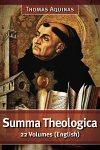
Summa Theologica (English)
- Author: Thomas Aquinas
- Translation: Fathers of the English Dominican Province
- Publisher: Burns, Oates & Washbourn
- Publication Date: 1912–1936
- Pages: 7,000+
The Summa Theologica represents the pinnacle of medieval theology and is arguably the most influential theological work in the history of Western Christianity.
In this massive tome, Thomas Aquinas outlines the reasons and meaning of all of Christian theology. As a theologian, Aquinas articulates the goals, purpose, and enterprise of theology, and gives theology a prominent place in scholarship, calling theology “the queen of sciences.” As a scholastic, Aquinas sought to understand Christian theology in light of the rediscovery of Aristotle’s works in the twelfth century, and redefined the relationship between revelation and reason, science and theology, and faith and philosophy for the next eight centuries. As a philosopher, Aquinas developed principles of just war and natural law, and outlined an argument for God’s existence from contingency—the intellectual forerunner to the modern Argument from Design. As an aesthetic, Aquinas articulated a vision of God’s beauty, and his aesthetic influence can be felt in the writings of literary figures as diverse as Dante Alighieri, James Joyce, and Umberto Eco.
The Logos edition of the Summa Theologica combines the 8-volume Latin text and the 22-volume English text into two individual electronic books, which means you can utilize the power of your digital library to read the Latin and English side-by-side!
It is certainly clear that the Summa Theologica can only be the work of a heart fundamentally at peace.
—Joseph Pieper
I couldn’t make any judgment on the Summa, except to say this: I read it every night before I go to bed. If my mother were to come in during the process and say, ‘Turn off that light. It’s late,” I with lifted finger and broad bland beatific expression, would reply, ‘On the contrary, I answer that the light, being eternal and limitless, cannot be turned off. Shut your eyes,’ or some such thing. In any case I feel I can personally guarantee that St. Thomas loved God because for the life of me I cannot help loving St. Thomas.
—Flannery O’Connor
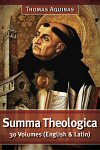
Summa Theologica (Latin)
- Author: Thomas Aquinas
- Publisher: Burns, Oates & Washbourn
- Publication Date: 1912–1936
- Language: Latin
- Pages: 3,000+
The Summa Theologica represents the pinnacle of medieval theology and is arguably the most influential theological work in the history of Western Christianity.
In this massive tome, Thomas Aquinas outlines the reasons and meaning of all of Christian theology. As a theologian, Aquinas articulates the goals, purpose, and enterprise of theology, and gives theology a prominent place in scholarship, calling theology “the queen of sciences.” As a scholastic, Aquinas sought to understand Christian theology in light of the rediscovery of Aristotle’s works in the twelfth century, and redefined the relationship between revelation and reason, science and theology, and faith and philosophy for the next eight centuries. As a philosopher, Aquinas developed principles of just war and natural law, and outlined an argument for God’s existence from contingency—the intellectual forerunner to the modern Argument from Design. As an aesthetic, Aquinas articulated a vision of God’s beauty, and his aesthetic influence can be felt in the writings of literary figures as diverse as Dante Alighieri, James Joyce, and Umberto Eco.
The Logos edition of the Summa Theologica combines the 8-volume Latin text and the 22-volume English text into two individual electronic books, which means you can utilize the power of your digital library to read the Latin and English side-by-side!

Summa contra Gentiles
- Author: Thomas Aquinas
- Translator: Fathers of the English Dominican
- Publisher: Burns Oates & Washbourne
- Publication Dates: 1923–1929
- Pages: 1,265
As the most influential apologetic work of the Western Church, the Summa contra Gentiles has shaped and defined theological and philosophical inquiry for hundreds of years. This vast work aims to establish the truth of the Christian religion by laying out a defense of the Christian faith from the perspective of both faith and reason. In doing so, Thomas Aquinas helps establish the method, purpose, and grounding for both theology and philosophy.
The Summa contra Gentiles is divided into four books. In the first three books, Aquinas is concerned the lay out a defense of the Christian faith from the perspective of natural theology—the common ground between “Christians and infidels.” These books contain arguments for the existence of God, discussions of ethics and morality, and other statements about God and the world which can be derived from the faculties of reason. Each section describes and defends God’s knowledge, God’s actions in creation, and the purpose and fulfillment—the telos—of all things in God. The fourth and final book of Summa contra Gentiles delineates the knowledge received through divine revelation, such as the Incarnation, the Trinity, and the Resurrection.
The English translation of the Summa contra Gentiles by the Fathers of the English Dominican Province is the first unabridged English translation. This translation was first published during the 1920s by Burns Oates & Washbourne and has been reprinted numerous times throughout the twentieth century. The Logos edition of Summa contra Gentiles combines 4 volumes into one electronic book.

Catena Aurea: Commentary on the Four Gospels, Collected out of the Works of the Fathers, Volume 1: St. Matthew
- Author: Thomas Aquinas
- Publisher: John Henry Parker
- Publication Date: 1841
St. Thomas Aquinas’ Catena Aurea is a masterpiece anthology of Patristic commentary on the Gospels, and includes the work of over 80 Church Fathers.
In the 13th century, Pope Urban IV, desiring that scholars of his day be better acquainted with the ideas of early Christians, assigned Saint Thomas Aquinas to compile a commentary on the Gospels based on the teachings of the Church Fathers. The result is the Catena Aurea, or “Golden Chain.” St. Thomas Aquinas’ work demonstrates intimate acquaintance with the Church Fathers and is an excellent complement to the more recent attempts to understand the inner meaning of the Sacred Scriptures.
This volume of the Catena Aurea treats the Gospel of Matthew. It starts by indicating the verses to be analyzed, then phrase-by-phrase, provides the early Fathers’ insights into the passage.

Catena Aurea: Commentary on the Four Gospels, Collected out of the Works of the Fathers, Volume 2: St. Mark
- Author: Thomas Aquinas
- Publisher: John Henry Parker
- Publication Date: 1841
St. Thomas Aquinas’ Catena Aurea is a masterpiece anthology of Patristic commentary on the Gospels, and includes the work of over 80 Church Fathers.
In the 13th century, Pope Urban IV, desiring that scholars of his day be better acquainted with the ideas of early Christians, assigned Saint Thomas Aquinas to compile a commentary on the Gospels based on the teachings of the Church Fathers. The result is the Catena Aurea, or “Golden Chain.” St. Thomas Aquinas’ work demonstrates intimate acquaintance with the Church Fathers and is an excellent complement to the more recent attempts to understand the inner meaning of the Sacred Scriptures.
This volume of the Catena Aurea treats the Gospel of Mark. It starts by indicating the verses to be analyzed, then phrase-by-phrase, provides the early Fathers’ insights into the passage.

Catena Aurea: Commentary on the Four Gospels, Collected out of the Works of the Fathers, Volume 3: St. Luke
- Author: Thomas Aquinas
- Publisher: John Henry Parker
- Publication Date: 1841
St. Thomas Aquinas’ Catena Aurea is a masterpiece anthology of Patristic commentary on the Gospels, and includes the work of over 80 Church Fathers.
In the 13th century, Pope Urban IV, desiring that scholars of his day be better acquainted with the ideas of early Christians, assigned Saint Thomas Aquinas to compile a commentary on the Gospels based on the teachings of the Church Fathers. The result is the Catena Aurea, or “Golden Chain.” St. Thomas Aquinas’ work demonstrates intimate acquaintance with the Church Fathers and is an excellent complement to the more recent attempts to understand the inner meaning of the Sacred Scriptures.
This volume of the Catena Aurea treats the Gospel of Luke. It starts by indicating the verses to be analyzed, then phrase-by-phrase, provides the early Fathers’ insights into the passage.

Catena Aurea: Commentary on the Four Gospels, Collected out of the Works of the Fathers, Volume 4: St. John
- Author: Thomas Aquinas
- Publisher: John Henry Parker
- Publication Date: 1841
St. Thomas Aquinas’ Catena Aurea is a masterpiece anthology of Patristic commentary on the Gospels, and includes the work of over 80 Church Fathers.
In the 13th century, Pope Urban IV, desiring that scholars of his day be better acquainted with the ideas of early Christians, assigned Saint Thomas Aquinas to compile a commentary on the Gospels based on the teachings of the Church Fathers. The result is the Catena Aurea, or “Golden Chain.” St. Thomas Aquinas’ work demonstrates intimate acquaintance with the Church Fathers and is an excellent complement to the more recent attempts to understand the inner meaning of the Sacred Scriptures.
This volume of the Catena Aurea treats the Gospel of John. It starts by indicating the verses to be analyzed, then phrase-by-phrase, provides the early Fathers’ insights into the passage.
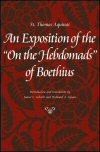
An Exposition of the “On the Hebdomads” of Boethius
- Author: Thomas Aquinas
- Translators: Janice L. Schultz and E. Synan
- Series: Thomas Aquinas in Translation
- Publisher: Catholic University of America
- Publication Date: 2001
- Pages: 132
In his sixth-century work commonly known as the De Hebdomadibus, Boethius (ca. 480–524) poses the question of how created things or substances can be good just as they are—that is, good just by existing—without being the same as the source of all goodness, God, who is understood to be Goodness Itself. In his commentary written in the thirteenth century, St. Thomas Aquinas sets out to explain the problem Boethius is treating as well as to explicate Boethius’ solution. In doing so, however, the Angelic Doctor suggests a more developed analysis of goodness, based on his own metaphysical perspective.
The introduction to this translation provides critical historical background, including an account of the influence of Cicero and Augustine, for understanding Boethius’ view of being, or esse. Based on historical and textual analysis, the authors reaffirm the “traditional” interpretation, which holds that, for Boethius, esse indicates form rather than a distinct act of being. In articulating the difference between Boethius’ and Aquinas’ positions on esse and goodness, and hence the relation of esse and goodness, Schultz and Synan show not only that Aquinas was respectful of Boethius’ stance, but that his own position could be seen as a development in harmony with his predecessor’s thought. The work will be valuable to those interested in the fundamental philosophical and theological questions facing medieval thinkers and Aquinas’ metaphysical thought in particular.
This volume represents the English translation. The Latin text is included a separate download for easy side-by-side comparison.
What emerges from this fascinating book is an account by the last Roman of goodness and existence, an active interpretation of that work by the Angelic Doctor, and a helpful introductory essay, in which the translators discuss the mechanics of Thomas’ reinterpretation. Consequently, this volume will be important for people with a rather large range of interests—metaphysics, late ancient philosophy, hermeneutics . . . The book is an outstanding piece of work.
—The Heythrop Journal
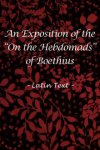
An Exposition of the “On the Hebdomads” of Boethius (Latin)
- Author: Thomas Aquinas
- Translators: Janice L. Schultz and E. Synan
- Series: Thomas Aquinas in Translation
- Publisher: Catholic University of America
- Publication Date: 2001
- Language: Latin
- Pages: 132
This volume represents the 1992 Leonine critical edition of Aquinas’ Latin text of An Exposition of the “On the Hebdomads” of Boethius. The English and Latin texts are separated into individual downloads for easy side-by-side comparison.
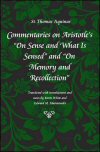
Commentaries on Aristotle’s “On Sense and What Is Sensed” and “On Memory and Recollection”
- Author: Thomas Aquinas
- Translators: Kevin White and Edward Macierowski
- Series: Thomas Aquinas in Translation
- Publisher: Catholic University of America
- Publication Date: 2005
- Language: English and Latin
- Pages: 268
In traditional catalogs of Aristotle’s works, On Sense and What Is Sensed and On Memory and Recollection are the immediate sequels to his On the Soul, and the first two books of his so-called Parva Naturalia, or “little works in natural philosophy.” In keeping with this order, Thomas Aquinas began his series of Aristotelian commentaries with a commentary on On the Soul, which he followed with commentaries on On Sense and What Is Sensed and On Memory and Recollection, written in 1268–1270. Until now, these latter two commentaries have never been published in English translation.
The translations presented in this volume are based on the critical Leonine edition of the commentaries, which includes the Latin translations of the Aristotelian texts on which Aquinas commented. The volume includes English translations of these Latin translations, allowing the reader to compare Aristotelian text and Thomistic commentary in detail. The translations of both commentaries are furnished with introductions and notes by the translators.
This volume does the great service of making Aquinas’ commentaries on these two short works available in English for the first time. This volume makes a serious and worthwhile contribution to the study of Aquinas, Aristotle, and the tradition to which they both belong.
—Arthur Madigan, former chair of philosophy, University of Munich
The translations are clear and literate . . . [of] immediate interest to specialists in medieval philosophy and Thomists, especially in so far as it helps to clarify questions of psychology and epistemology in Aquinas’ thinking about the soul (anima).
—The Classical Outlook
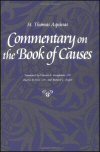
Commentary on the Book of Causes
- Author: Thomas Aquinas
- Translators: Vincent A. Guagliarod, Charles R. Hess, and Richard C. Taylor
- Series: Thomas Aquinas in Translation
- Publisher: Catholic University of America
- Publication Date: 1996
- Pages: 193
The Book of Causes, highly influential in the medieval university, was commonly, but incorrectly, understood to be the completion of Aristotle’s metaphysics. It was Thomas Aquinas who first judged it to have been abstracted from Proclus’ Elements of Theology, presumably by an unknown Arabic author, who added to it ideas of his own.
The Book of Causes is of particular interest because themes that appear in it are echoed in the metaphysics of Aquinas: its treatment of being (esse) as proceeding from the First Creating Cause; the triadic scheme of being, living, and knowing; and the general scheme of participation in which “all is in all.” Thus, the Book of Causes provides a historical backdrop for understanding and appreciating Aquinas’ development of these themes in his metaphysics.
Thomas’ Commentary on the Book of Causes, composed during the first half of 1272, is a distinct philosophical work in its own right. It provides an extended view of his approach to Neoplatonic thought and functions as a guide to his metaphysics. Though long neglected and, until now, never translated into English, it deserves an equal place alongside his commentaries on Aristotle and Boethius.
In addition to the extensive annotation, bibliography, and thorough introduction, this translation is accompanied by two valuable appendixes. The first provides a translation of another version of proposition 29 of the Book of Causes, which was not known to St. Thomas. The second lists citations of the Book of Causes found in the works of St. Thomas and cross-references these to a list showing the works, and the exact location within them, where the citations can be found.
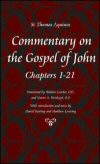
Commentary on the Gospel of John: Chapters 1–21
- Author: Thomas Aquinas
- Editors: Daniel Keating and Matthew Levering
- Translators: Fabian Larcher and James Weisheipl
- Series: Thomas Aquinas in Translation
- Publisher: Catholic University of America
- Publication Date: 2010
- Pages: 943
Thomas Aquinas possessed excellent knowledge of the commentaries of Origen, John Chrysostom, and Augustine. On the basis of this foundation, he produced his own commentary on the Gospel of John as part of his task as a Master of the Sacred Page. Considered a landmark theological introduction to the Fourth Gospel, these lectures were delivered to Dominican friars when Aquinas was at the height of his theological powers, when he was also composing the Summa Theologiae. For numerous reasons, the Summa has received far more attention over the centuries than has his Commentary on the Gospel of John. However, scholars today recognize Aquinas’ biblical commentaries as central sources for understanding his theological vision and for appreciating the scope of his Summa Theologiae.
The first English translation of Aquinas’ Commentary on the Gospel of John by Fabian Larcher and James Weisheipl, now long out of print, is available to scholars and students once again with this edition. Published in three volumes simultaneously, it includes a new introduction and notes pointing readers to the links between Aquinas’ biblical commentary and his Summa Theologiae. When a verse from the Gospel of John is directly quoted in the Summa Theologiae, the editors note this in the commentary. Aquinas’ patristic sources, including Origen and Augustine, are carefully identified and referenced to the Patriologia Latina and Patrologia Graeca. The commentary’s connections with Aquinas’ Catena Aurea are also identified.
While the most significant aspect of the publication is Aquinas’ text itself, the introduction and notes provide excellent aides to the reader and enrich the text. Daniel Keating and Matthew Levering contribute a clear and helpful introduction to the translation, providing brief but very useful explanatory notes about early writers and controversies.
—David M. Gallagher, consulting scholar at the James Madison Program, Princeton University
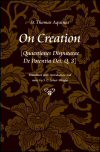
On Creation
- Author: Thomas Aquinas
- Translator: Susan C. Selner-Wright
- Series: Thomas Aquinas in Translation
- Publisher: Catholic University of America
- Publication Date: 2011
- Pages: 202
Thomas Aquinas wrote his Disputed Questions on the Power of God (Quaestiones Disputatae de Potentia Dei) in Rome in 1265–1266. Begun, though probably not completed, before he wrote the first part of his famous work, the Summa Theologiae, the de Potentia Dei considered 10 questions that evoked lively debate in Thomas’ day and continue to do so in our own.
This volume includes a new English translation of Question 3, in which Thomas takes up questions and ideas about divine and human freedom, whether or not the world is created, the problem of evil, the efficacy of creatures, and the status of the developing human embryo. It offers a comprehensive treatment of creation and the metaphysics and anthropology Thomas employs in considering the general creation of the universe and the particular creation of each human being.
Susan C. Selner-Wright’s translation of the critical Leonine edition is intended to make Thomas’ contribution to the current discussion more accessible. It constitutes a focused but extended example of Thomas at the height of his intellectual powers. We find him here in conversation with 50 different source works, engaged with the ideas of pagan, Christian, Islamic, and Jewish thought, and demonstrating his understanding of philosophy and theology as distinct but complementary disciplines. Throughout the text, Selner-Wright directs the reader to Thomas’ own sources, related texts elsewhere in Thomas’ corpus, and secondary sources. Philosophical notes give background for particular claims or arguments and trace important philosophical principles at work throughout the text.
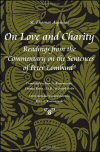
On Love and Charity: Readings from the Commentary on the Sentences of Peter Lombard
- Author: Thomas Aquinas
- Translators: Peter A. Kwasniewski, Thomas Bolin, and Joseph Bolin
- Series: Thomas Aquinas in Translation
- Publisher: Catholic University of America
- Publication Date: 2008
- Pages: 404
Among the great works of Thomas Aquinas, the Commentary on the Sentences of Peter Lombard has suffered almost total neglect among translators. Such neglect is surprising, considering that the massive commentary—more than 4,000 pages in the last printed edition—is not only Aquinas’ first systematic engagement with all the philosophical and theological topics on which he expended his energy over the span of a short career, but is also characterized by an exuberance and elaborateness seldom found in his subsequent writings. Although Chenu had already drawn attention decades ago to the importance of studying this youthful tour de force for a fuller understanding of Thomas’ more mature work, the Commentary on the Sentences has remained a closed book for many modern students of Thomistic and medieval thought because of its relative inaccessibility in English or in Latin.
The present volume, containing all the major texts on love and charity, makes available what is by far the most extensive translation ever to be made from the commentary with the added benefit that the better part of the translation is based on the (as yet unpublished) critical edition of the Leonine Commission. The collection of texts from all four books has a tight thematic coherence that makes it invaluable to students of Thomas’ moral philosophy, moral theology, and philosophical theology. In addition, the inclusion of parallel texts from Aquinas’ first (Parisian) commentary as well as from his second (Roman) attempt at a commentary, the recently rediscovered Lectura Romana, makes this edition all the more valuable for those who wish to track the internal development of Thomas’ thinking on these matters.
[T]he present volume contains by far the most extensive English translation from the Scriptum to date . . . The translators of On Love and Charity have aimed to give a translation which is neither too literal nor too liberal, trying to find the golden mean between an unintelligibly Latinized or an enjoyable but unfaithful English version . . . This impressive volume will be of a great help for those wishing to study Aquinas and the issue of love in more depth.
—Ephemerides Theologicae Lovanienses
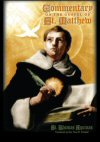
Commentary on the Gospel of St. Matthew
- Author: Thomas Aquinas
- Translator: Paul M. Kimball
- Publisher: Paul M. Kimball
- Publication Date: 2012
- Pages: 1,024
Commentary on the Gospel of St. Matthew is a translation of St. Thomas Aquinas’ lectures on the Gospel of St. Matthew given in Paris in approximately the year 1270. This is the first ever English translation of this major work. It is a useful commentary, especially as an aid for preaching sermons. Numerous explanations and cross references to other works of St. Thomas are given in the text. St. Thomas is a master of Scripture and the Church Fathers, which are continuously interwoven in this simple but profoundly enlightening text.
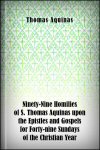
Ninety-Nine Homilies of S. Thomas Aquinas upon the Epistles and Gospels for Forty-Nine Sundays of the Christian Year
- Author: Thomas Aquinas
- Translator: John M. Ashley
- Publisher: Church Press Company
- Publication Date: 1867
- Pages: 182
These homilies by the great St. Thomas Aquinas are divided into the following groups:
- The Advent Homilies (9)
- The Epiphany and Ante-Lenten Homilies (16)
- The Lenten Homilies (12)
- The Easter Homilies (12)
- The Homilies from Trinity to Advent, part 1 (24)
- The Homilies from Trinity to Advent, part 2 (26)
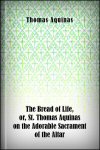
The Bread of Life, or, St. Thomas Aquinas on the Adorable Sacrament of the Altar
- Author: Thomas Aquinas
- Translator: Henry Augustus Rawes
- Publisher: Burns & Oates
- Publication Date: 1879
- Pages: 303
Divided into seven parts, The Bread of Life consists of 30 meditations on the Blessed Sacrament. Henry Augustus Rawes has translated the original Latin into English and provided summaries for each meditation in the table of contents.

The Religious State: The Episcopate and the Priestly Office
- Author: Thomas Aquinas
- Translator: J. Procter
- Publisher: The Newman Press
- Publication Date: 1950
- Pages: 166
An English translation of De perfectione spiritualis uitae, The Religious State, the Episcopate and the Priestly Office explores the doctrines concerning religious life and Christian perfection.
Thomas Aquinas (1225–1274) entered the Benedictine abbey of Montecassino at the age of five to begin his studies. He was transferred to the University of Naples at age 16, where he became acquainted with the revival of Aristotle and the Order of the Dominicans. Aquinas went on to study in Cologne in 1244 and Paris in 1245. He then returned to Cologne in 1248, where he became a lecturer.
Aquinas’ career as a theologian took him all over Europe. In addition to regularly lecturing and teaching in cities throughout Europe, Aquinas participated regularly in public life and advised both kings and popes. Thomas Aquinas died on March 7, 1274 while traveling to the Second Council of Lyons. Fifty years after his death, Pope John XXII proclaimed Aquinas a saint. The First Vatican Council declared Aquinas the “teacher of the church.” In 1879, Pope Leo XII declared the Summa Theologica (22 vols.) the best articulation of Catholic doctrine, and Aquinas was made the patron saint of education. He is a Doctor of the Church, and is sometimes known as the “Angelic Doctor.”
Thomas Aquinas also profoundly influenced the history of Protestantism. He wrote prolifically on the relationship between faith and reason, as well as the theological and philosophical issues which defined the Reformation.